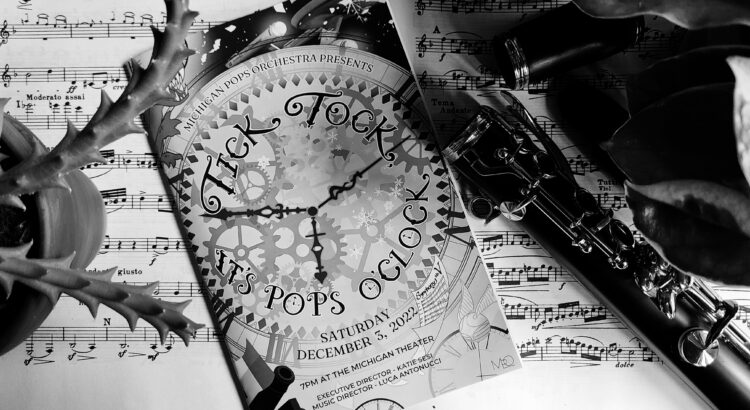7:00pm • Saturday, December 3, 2022 • Michigan Theater
This was my first experience as an audience-member for the Michigan Pops Orchestra. While I knew beforehand their reputation for wacky, fun performances, I was still surprised and delighted by the personality the musicians brought into their work. Not only did they play with excellence, but musicians were featured in short skits introducing the music, as well as in videos made to accompany the program. I’ve never been to an orchestra performance with so many musician-specific fan bases–Anthony Medei, co-tech director and viola player, seemed particularly popular in his comedic features as Milly Bagic, Doc Brown, and the evening’s gameshow host.
The orchestra took several opportunities during the evening to wish farewell to its current executive director, Katie Sesi, a graduating senior. One of my favorite moments during the performance was during the final few measures of Amilcare Ponchielli’s “Dance of the Hours.” As she played, a little anticipatory smile appeared on Sesi’s face that widened into a full grin as the orchestra struck the final note of the song, a moment which I felt sweetly captured the dedication and love Pops musicians feel for the organization.
One of the pieces I heard Michigan Pops would interpret on Saturday night, and which impelled me to buy tickets, was “Time Warp” from Rocky Horror Picture Show. I am a big RHPS fan, and I was curious about how a glam rock piece could be arranged for orchestra. Coincidentally, during the performance a story was shared about how the executive board had to scour the internet for an orchestra score of the piece, finally locating one used by an obscure orchestra in Germany. Ultimately, although the musicians did an admirable job of bringing the piece to fruition, my final opinion is that orchestra-Time-Warp might have been better left in Germany. Rocky Horror ≠ orchestra music.
Overall, however, I immensely enjoyed the mix of songs chosen by the orchestra, which in another context might seem eclectic, but which was roped together by the theme of “Time” encapsulated in the performance. True to its role as a “Pops” orchestra, the songs were almost all familiar to me. I liked how the program illustrated the versatility of orchestra as a medium, which throughout the evening alternately took center-stage in pieces like Beethoven’s Fifth and shifted gracefully into the background as, for example, a screen showed a student-created speed-run of Harry Potter and the Prizoner of Azkaban. Additionally, I appreciated how many of the songs Pops performs are famous enough that everyone might have heard of them, but not everyone gets the chance to experience them live in concert. Michigan Pops offers an accessible opportunity for audiences to experience iconic music live and an entry point for everyone to get interested in orchestra.




